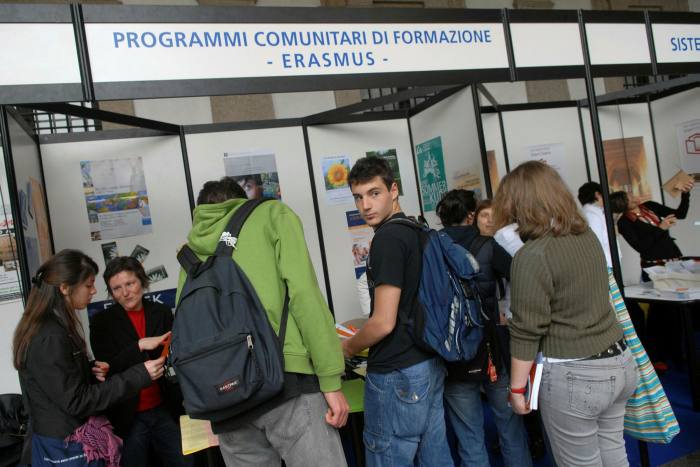UK’s Erasmus exit prompts laments on both sides of the Channel
Ameera Rajabali and Olivia Stanca-Mustea expended Xmas absent from house this yr, but neither was specifically lonely.
The pair, from the British isles and Romania respectively, achieved as graduate college students in Heidelberg in 2015 right after having aspect in the Erasmus European trade programme. Soon after bonding above their ordeals they turned best pals — dwelling, performing and now investing lockdown Xmas alongside one another in Berlin.
“Whenever you meet an individual from Erasmus, you have an rapid bond,” reported Ms Stanca-Mustea, who expended a yr at Durham University as aspect of the trade.
For her, Erasmus supplied entry to substantial-calibre British isles programmes, while Ms Rajabali reported it introduced expanded horizons and new pals.
Long run generations, having said that, will not all love the very same chances. Less than the Brexit offer introduced previous week, the British isles will go away Erasmus right after 33 many years and hundreds of thousands of British isles members.
Erasmus is an EU programme that resources university college students to analyze abroad for a yr or semester at a university in Europe. Because 2014, as Erasmus+, it has expanded to supply other chances this sort of as do the job placements and training exchanges.
Even though agreed jobs will go on to be funded, overseas analyze exchanges and other schemes will no longer be offered in the British isles or to British isles college students in Europe.
Former Erasmus college students are mourning that Brexit will close what lots of termed the defining expertise of their youth.
“It breaks my coronary heart to know they are not only heading to lose entry to this unbelievable plan but the close of flexibility of motion will sever chances for them more,” reported Flora Menzies, originally from Manchester who expended her yr abroad studying in Italy.
Now 35 and head of audience at London charity Into Movie, she reported her Erasmus yr at the University of Bologna “quite literally” changed her lifestyle.
“The British isles has so a lot to learn from its European neighbours and I worry for a submit-Brexit truth that is inward-hunting, culturally impoverished and regressive.”
Veronika Sohlström, whose household fled communist-era Poland for Germany, reported she could hardly ever have afforded to see the British isles had it not been for Erasmus, which funded her yr at the University of East Anglia in 2006.
Now a programme supervisor at the Dag Hammerskjöld Foundation in Sweden, an worldwide organisation focused on international governance and peacebuilding, she credits her British isles studies for her profession.
“The concept of this kind of possibility, that I could analyze in the British isles, could hardly ever have happened for my moms and dads,” she reported. “For folks like me who came from a household that didn’t have the financial signifies, it opens doorways.”
Previous yr, 54,619 folks took aspect in British isles-led Erasmus chances, funded by grants totalling €145m. Of these, nine,993 were British college students on placements in Europe, with seventeen,768 Europeans coming to the British isles. The other people were members on vocational trainings and other Erasmus+ programmes.
Soon after Brexit, these exchanges will be changed by the Turing plan, a £100m British isles federal government programme for 35,000 college students to acquire aspect in worldwide analyze placements in 2021/22.
“We have made a definitely worldwide plan which is focused on our priorities, provides real worth for money and sorts an critical aspect of our promise to amount up the United Kingdom,” reported Gavin Williamson, the training secretary.
But these performing in the sector are sceptical.
Professor Paul James Cardwell, a regulation professor and Erasmus co-ordinator at the University of Strathclyde in Scotland, reported infrastructure coated by Erasmus — agreements on program credits, tuition fees and other types of assist — would now have to be renegotiated in a bureaucratic and high-priced course of action.
The approximated £2,800 for every university student coated by Turing funding seems to be meagre when compared with this task and the charges of flights, tuition and lodging in nations around the world like Australia or the US.
“When exchanges are operate appropriately you have college students from all kinds of backgrounds acquire aspect. It improves these youthful people’s long-term prospects,” he reported.
“My worry is that in coming out of Erasmus, these college students are in the long term not heading to have these chances.”
The Turing plan also addresses only 50 percent of an Erasmus-style trade, funding British college students on placements overseas but not these travelling to analyze in the British isles. Prof Cardwell reported this gave minor incentive for foreign universities to acquire aspect in the programme and deprived British isles college students of the prospect to learn along with other people from all over the environment.
Ireland reported it would fund hundreds of Northern Ireland college students to participate in the Erasmus exchanges by enabling them to sign-up temporarily at Irish institutions, at a cost of €2.1m for every yr.
“This proposal is also a sensible expression of solidarity and aims to supply ongoing entry to EU chances to youthful folks in Northern Ireland in what could be an uncertain social and financial ecosystem,” reported Simon Harris, Irish minister for more and bigger training.
The British federal government insists the Turing programme will be an improvement, affording entry to chances past Europe for a more varied array of college students than the Erasmus programme.
But Professor Tanja Bueltmann, the daughter of a German seamstress and a manufacturing facility worker who was encouraged to do a PhD right after Erasmus, reported the concept that it was a plan for the liberal elite was “nonsense”.
“It permits folks from all types of diverse course and social backgrounds to expertise training abroad,” reported Prof Bueltmann, who is now a chair in worldwide background at the University of Strathclyde.
“When you’re developing a exploration ecosystem, you need college students, and when you have them from so lots of backgrounds and ordeals you’re all the richer. We’ll be a lot poorer for this.”








